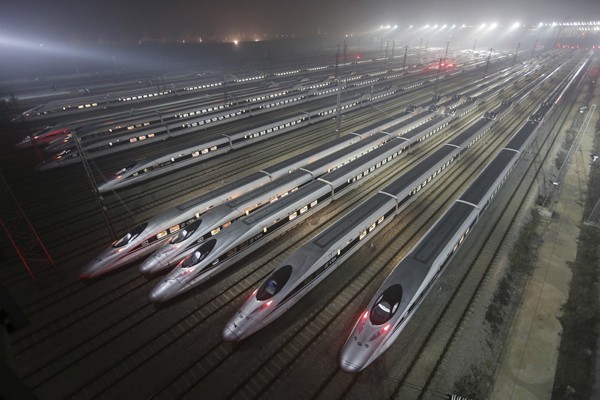Millions of Chinese citizens going home for their traditional Chinese New Year homecoming were surprised to find that the old ordeals of traveling have been replaced by the much smoother, civilized and comfortable transport brought about by China's modernized train network and ticketing system.
The advent of the modern railway system has increased the capacity of the transport system, making travel more comfortable for 300 million Chinese people going home to their respective provinces.
Apart from the modern bullet trains, the online real-name ticketing service reduced cases of scalping. The days where hopeful travelers would sleep on the chaotic train station, wishing for better seats or even travel tickets, are clearly now in the past.
Yang, a 40-year-old computer technician from Chongqing, said that he was very delighted as he boarded the G309 train from Beijing to Chongqing municipality. Like so many people in China, it was Yang's first time to travel on board the modern trains.
Back in the '80s, transportation across the mountainous Chongqing and Sichuan has been very difficult, and took several days to reach Beijing from Chongqing and Chengdu. These areas are the biggest source Chinese migrant labor, therefore more migrant passengers during the festival rush.
In 2011, electricity multiple unit (EMU) trains were briefly in operation, linking Sichuan and Beijing, a 15-hour journey with the speed of 200 kilometers per hour. However, the train services were cancelled after the notorious Aug. 2011 accident that killed 40 people in Zhejiang Province.
It was only on Jan. 1 of this year that high-speed trains began servicing the area, reducing the journey from Chongqing and Chengdu to Beijing to about 12 hours. With the normal train, the trip used to take 25 hours.
The modern trains prohibit standing-room-only tickets, thus the interiors are not congested, giving enough space for the passengers to stretch out in their seats. Cleaning staff collect waste baskets every two hours, thus cleaner interiors. The toilets are all accessible even for people with disabilities.
For Huang Jianmei, a Chinese traveler, the new system is a far cry from the old. This is the first time that Huang is returning home to Chongqing since she settled in Beijing in 2004. Now going home with her husband for the Spring Festival family reunion, Huang cannot help but recall the old days where, according to her, the only ticket you can buy are for the extra sevices offered by the railway during peak seasons.
Huang said as she recalled the ordeals of the old days: "There were much too many people in the carriage. Some passengers had to board through windows. It would take an hour to walk from one end of the carriage to the other. And forget about using the lavatory! There were passengers inside!"
Huang said that the journey was never decent. She admits she felt like livestock being transported to the slaughterhouse.



























